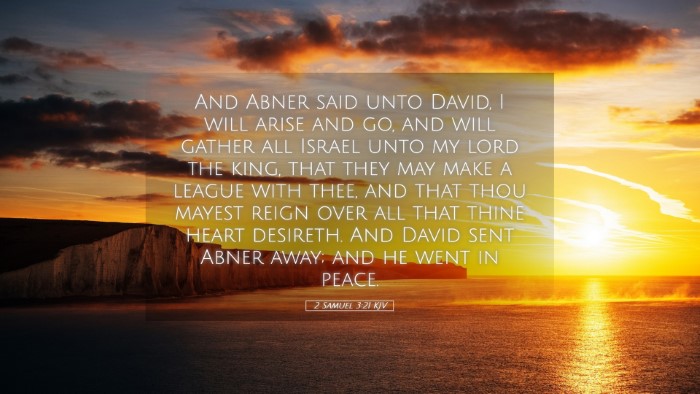Commentary on 2 Samuel 3:21
Verse: "And Abner said unto David, I will arise and go, and will gather all Israel unto my lord the king, that they may make a league with thee, and that thou mayest reign over all that thine heart desireth. And David sent Abner away; and he went in peace." (2 Samuel 3:21 KJV)
Introduction
This verse marks a pivotal moment in the narrative of the transition of power from Saul's house to David's reign. Abner, the commander of Saul's army, recognizes the legitimacy of David's kingship and seeks to facilitate the unification of Israel under David's rule. This commentary draws insights from notable public domain commentaries to elucidate the theological, historical, and practical implications of this verse.
Theological Insights
In this passage, we see a clear example of God's providential hand orchestrating the leadership over His people. The act of Abner coming to David signifies a turning point in Israel's history, emphasizing God's sovereignty in governance.
- Divine Order: Matthew Henry highlights the transition of power as a demonstration of God’s control over kingdoms. Henry notes that God led Abner to seek David as king, fulfilling the promises made to David.
- Unity and Peace: Albert Barnes reflects on the significance of Abner’s willingness to align with David, suggesting that this action represents a desire for peace and unity after years of division and conflict.
- David's Leadership: Adam Clarke underscores David's character, portraying him as a figure of unity among a fractured nation. Clarke posits that David's reception of Abner shows his capacity for forgiveness and reconciliation.
Historical Context
To fully appreciate this verse, we must consider the historical setting of the time. Israel was divided; there was ongoing conflict between the followers of Saul and those loyal to David. Abner had previously supported Saul’s son Ishbosheth, but his actions here demonstrate a significant shift. This moment cannot be isolated from the larger narrative that includes the long struggle for kingship and the unification of the tribes.
- Abner's Role: Understanding Abner's role as Saul's military commander provides insight into the dynamics of power during this transition. As noted by Clarke, Abner's authority and military experience were critical in consolidating support for David.
- Political Implications: Barnes points out that Abner’s initiative to gather Israel under David not only signifies a personal shift but also a collective movement toward a more stable political environment, which was paramount for national survival.
David’s Response
David's response to Abner is noteworthy. He sends Abner away in peace, which can be interpreted on multiple levels:
- Diplomatic Acumen: By sending Abner away in peace, David demonstrates his diplomatic wisdom. As noted by Henry, this action solidifies David’s reputation as a fair and just leader, reinforcing his suitability for the throne.
- Symbol of Covenant: The act of making a league or covenant is significant. Clarke remarks that the covenant is not merely political but carries spiritual weight in the context of God’s promise to David.
- Trust in Providence: David's decision reflects a profound trust in God’s timing and sovereignty, showing that he is not acting out of impulse but rather aligning himself with God’s will.
Implications for Leadership
This passage offers invaluable lessons for leaders both in church and community. The importance of unity, forgiveness, and the recognition of God’s calling in leadership is underscored here.
- Emphasis on Unity: Leaders must prioritize unity among diverse groups, recognizing that division often hinders progress. David’s example can inspire contemporary leaders to seek reconciliation, especially in times of strife.
- Integrity and Honor: The integrity with which David treats even those previously opposed to him showcases the type of character leaders should aspire to. As Matthew Henry suggests, righteous leaders are often those who win hearts through humility and honor.
- Trusting God’s Plan: This passage encourages leaders to trust in God’s overall plan for their lives and ministries, much like David did. In moments of uncertainty, remembering God's sovereignty can provide both peace and direction.
Conclusion
2 Samuel 3:21 serves as a profound reminder of God’s sovereign hand in the appointed leadership of His people. Through Abner’s actions and David’s response, we are offered a rich tapestry of theological depth, historical insight, and practical application for leadership today. As we interpret this passage, may we seek to emulate the virtues demonstrated by David and remain open to God’s guidance in our own lives.


